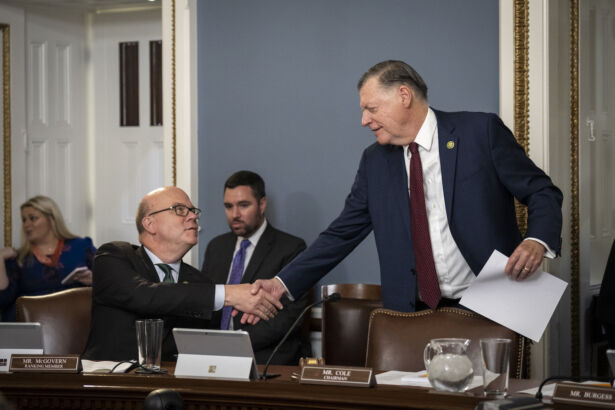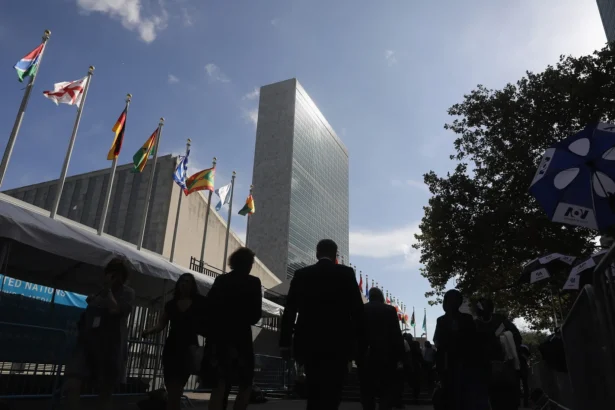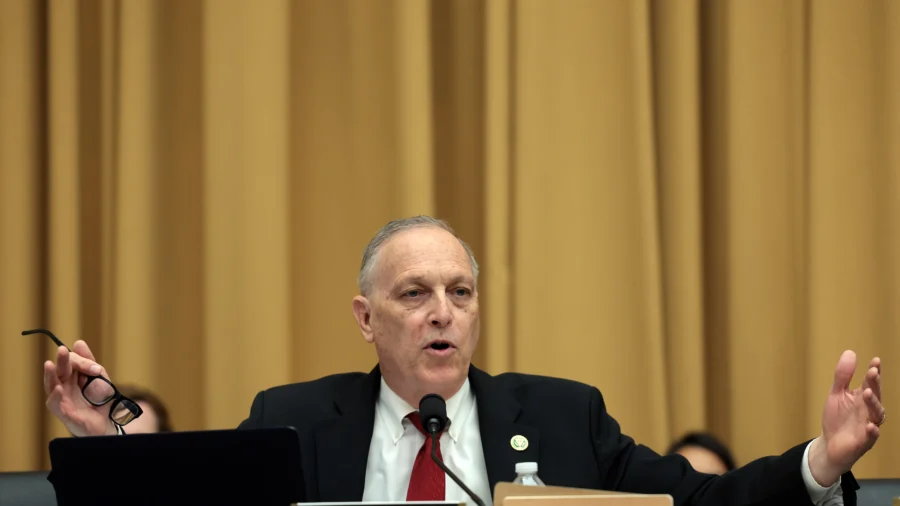The House is scheduled on Sept. 26 to stage another procedural vote on allowing budget bills to be debated individually on the floor when it convenes to consider four Fiscal Year 2024 (FY24) appropriations packages less than four days before the new fiscal year begins Oct. 1.
The House Rules Committee advanced the four budget bills to the floor in four partisan 9-2 votes cast during an hour-long Sept. 23 meeting after a near-five hour Sept. 22 hearing on the measures.
On tap will be the House’s proposed $1.5 trillion Farm Bill, $91.5 billion for the Homeland Security budget, a $52.5 billion State Department spending plan, and—for a third time—the $886.3 billion National Defense Authorization Act (NDAA).
The four appropriations packages are among 12 bills that constitute the annual federal budget. The House has only adopted one so far, meaning it must approve the remaining 11, resolve differences with the Senate’s budget bills, and get it all done by midnight, Sept. 30—a near impossible task.
If a budget is not in place by Oct. 1, either the federal government will partially shut down for the 11th time since 1980 or it will be sustained at present funding levels through a continuing resolution (CR) for the 48th time since 2010.
A proposed CR to fund the government for 31 days failed last week. Similar proposals are certain to surface, with negotiations on Capitol Hill between various GOP factions developing, it seems, various proposals by the minute.
The NDAA, or annual “must-pass” defense budget, has twice been denied a floor hearing by Republicans who are demanding that spending bills be debated individually rather than under “suspended rules.”
Conservatives, spearheaded by the House Freedom Caucus, want to use the rule process to cap federal top-line spending at $1.47 trillion, $120 billion less than the compromise bill negotiated by House Speaker Rep. Kevin McCarthy (R-Calif.) and President Joe Biden in May.
Aside from the inside-baseball procedural drama, the three “new” appropriations packages that will join the NDAA on the House floor on Sept. 26 will feature many of the same “culture war” add-ons that made defense budget hearings such rollicking affairs.
Among the anticipated highlights of proposals in the House will be at least two votes to strike all funding from Ukraine and other votes to withhold funding for the United Nations, to keep funding of Department of Agriculture agencies at FY19 levels, spending $2.1 billion to finish building the southern border wall, and to mandate E-Verify for legal employment checks nationwide.

None of these proposals are expected to fly in the Democrat-led Senate, which means, as Rep. Jim McGovern (R-Mass.) said, the whole budget battle among House Republicans is an exercise in futility.
“So, we will go through the motions here today,” he said during the Sept. 22 hearing. “But I plead with my colleagues to choose a different path here. This is an awful, awful, awful process and is being used to advance awful, awful, awful bills. Can we please just be honest? These bills are partisan talking points” with no chance of advancing in the Senate.
Budget Builds the Wall
The proposed FY24 Department of Homeland Security Appropriations Act, moved to the floor as HR 4367, cuts more than $11 billion from President Joe Biden’s overall $103.2 billion budget request but increases “discretionary” spending from $60.4 billion to $62.8 billion.
The House’s proposed $91.5 billion Department of Homeland Security (DHS) budget includes $2.1 billion to resume building the wall along the U.S.-Mexico border and $500 million to hire 22,000 more Border Patrol agents.
The bill requires that DHS Secretary Alejandro Mayorkas “adhere to the law and resume construction of physical barriers on the border immediately,” Mr. Cole (R-Okla.) said during the Sept. 22 hearing.
The House’s proposed spending plan “defunds the Biden administration social policy efforts” and instead directs money into “delivering an effective system, not political or cultural wish list.”
U.S. Customs and Border Protection calculates that more than 2 million illegal immigrants have been apprehended at the border in 2023, including more than 140,000 just this month, Mr. Cole said.
“That’s more people than the entire city of Norman, Oklahoma, trying to cross into the United States. And the month isn’t over,” he said, adding that the budget bill essentially absorbs HR 2, the comprehensive border security and immigration reform bill that the House adopted earlier this year.
House Appropriations Committee Homeland Security Subcommittee Chair Rep. Dave Joyce (R-Ohio) said the bill “forces the Biden administration to do what it will not do on its own—address the border security crisis that has been raging for the last 20 years. The funding and policy provisions included in this bill are in lockstep with the provisions of HR 2, which together will put us on a path to securing the border.”
Mr. Joyce said the House version earmarks $305 million for “non-intrusive inspection equipment” at border points-of-entry to help curtail the flow of drugs, including fentanyl.
The bill provides funding for 41,500 detention beds, “which is 16,500 more than this administration requested to ensure ICE has adequate capacity to retain [illegal immigrants awaiting] final removal orders,” he said.
The House DHS budget bill provides an additional $335 million for the Coast Guard to expand fast-response cutter patrols in the Arctic and western Pacific.
Mr. Joyce said the proposed budget includes HR 2’s asylum and parole reforms to ensure the programs are less likely to be abused.
“I don’t know how much is too much for my colleagues on the other side of the aisle to recognize how important it is to shut down the abuse of the border,” he said. “And that is just a simple reality.”
Rep. Henry Cuellar (D-Texas) said, “I don’t just go visit the border … I live on the border.” He said he often speaks with the Border Patrol agents working to secure the border around his home.
“They’re worried about if there’s a shutdown because if you look at the numbers of people coming in, what the Border Patrol is facing right now, and then to tell them that you’re going to continue working without a paycheck” is demoralizing, he said.
In response, Mr. Joyce said, “We’re talking about shutting down the government? Well, to avoid shutting down the government, why don’t we do our job to shut down a wide open border and force it into actual compliance with the law?”
Mr. Cuellar said the proposed DHS budget invests too much on the “one-yard line” and not enough in immigration enforcement beyond the border.
“We are talking about putting so many resources on the one-yard line called the border. What we have to do is extend the perimeter and look at what you do on the 20-yard line,” he said. “We have to look at more resources outside the mainland authorities where they can do the work border.”
Mr. McGovern mocked the $2.1 billion allocation for “a ridiculous and outdated border wall that will do nothing at all to stop illegal border crossings.”
While spending money on the wall, he said the proposed budget “cuts funding for terrorism prevention and cybersecurity protection … funding that would be used to process [illegal immigrants’] cases faster. It doesn’t make any sense.”
“Some of us forgot that somebody said Mexico was going to pay for the wall. So why have the taxpayers do that?” Mr. Cuellar said, calling it a “14th century solution” and suggesting the House “use the monies to provide more security at the border.”
“Walls don’t work? I think the doors to this facility lock for keeping people out. I think the doors on our houses keep people out,” Rep. Ralph Norman (R-S.C.) said. “And I would add the wall is paid for. The steel is on the ground.”
Mr. Norman said illegal crossings in the San Diego border sector declined 90 percent after the border wall there was extended by 60 miles. But because DHS failed to plug gaps in the wall near Yuma, Ariz., the border town is seeing 800 to 1,200 more illegal immigrants each day on its streets.
“You can go down tp Yuma. You can go down to Nogales, Arizona. You can go down near various places in Texas and you’ll see material that we paid for. All you have to do is put it up and put it in,” he said.
Reps. Andy Biggs (R-Ariz.) and Matt Rosendale (R-Mont.) were among the House conservatives who introduced more than 250 proposed amendments to the appropriations measure.
Mr. Biggs’ amendments would prohibit the sale of unused border wall materials, the use of funds to implement vaccine or mask mandates, the use of funds “in furtherance of the Deferred Action for Childhood Arrivals” (DACA) final rule,” the “zero out” of numerous appointed officials’ salaries, and measures to stop the DHS from “obstructing the IGs oversight efforts.”
His amendment package also calls for impeaching Mr. Mayorkas “for a lot of reasons,” he said.
Among Mr. Rosendale’s amendments is a measure repealing Mr. Mayorkas’ memo that prohibits ICE “from making raids to find out where illegals are located and to remove them from our country.
“This would make sure that that doesn’t happen anymore,” the representative said.
Another amendment sponsored by Mr. Rosendale would mandate E-Verify at a federal level.
“Business owners and ranchers in Montana work extremely hard to ensure they’re in compliance with federal immigration law and this memo punishes law-abiding businesses who refuse to hire illegal aliens,” he said. “Normal Americans should not be forced to compete in the labor market with illegal aliens for depressingly low wages.”

Budget Defunds the UN
The House’s proposed $52.5 billion FY24 Department of State, Foreign Operations, and Related Programs Appropriations Act, adopted as HR 4665, trims nearly a quarter—$16.4 billion—from President Biden’s budget request by eliminating contributions to dozens of international organizations, suspending funding for the United Nations and the U.S. Agency for International Development (US AID), and “clawing back $11.14 billion of the Democrats’ wasteful spending over the last two years,” Mr. Cole said.
The proposed spending plan “provides funds where they’re needed most,” he said, delivering “full support for key allies in the Middle East, like Israel, Egypt, and Jordan. [It] provides $4.4 billion for national security interests in the Indo-Pacific region, funding which is critical to countering communist China’s malign influence.”
In addition, Mr. Cole said, the House appropriations package “maintains long standing Pro-Life protections, supports the expanded ‘Mexico City Policy,’ and prohibits the funding to the United Nations Population Fund and other related programs that support abortion. [It] and also devotes investments to countering the flow of fentanyl and other illicit drugs in the Western Hemisphere, and supports freedom and democracy by countering malign communist influence.”
The proposed House State Department spending plan is $7.2 billion, or 12 percent, less than this year’s budget and $1.7 billion below FY19’s enacted level.
“Let me just be really clear what this bill does. If you are a friend or an ally of the United States, this will support you. But if you’re an adversary, or you are cozying up to the adversaries of the United States, let me be very frank: You’re not going to like it,” House Appropriations Committee State and Foreign Operations Subcommittee Chair Rep. Mario Diaz Balart (R-Fla.) said.
Democrats argued that the bill would actually cut the State Department’s operations budget by 31 percent and gut contributions to international organizations by 82 percent.
“We are told that this funding bill is tough on our adversaries, but the opposite is true,” Rep. Rosa Laura (D-R.I.) said. “This bill cedes America’s position as the leader of the global community. This is a reversal of the United States historic position on a world stage and it promotes isolationism.”
The proposed State Department budget “completely unravels the hard fought credibility and influence that we’ve worked so hard to achieve on the world stage,” Mr. McGovern said. “It’s also full of a bunch of MAGA culture war riders. Trying to ban abortion nationwide wasn’t enough, now Republicans want to ban abortion worldwide through a global gag rule. I mean, banning pride flags from flying alongside the American flag at a U.S. embassy? With all the problems in the world? That’s what we’re focused on? Are you kidding me?” he said.
In June 2022, the U.S. Supreme Court decided to overturn Roe v. Wade, which didn’t ban abortions but transferred power back to state governments to decide their laws around the practice.
Proposals Guided by New Audits: Conservatives
Mr. Balart said his panel did “a very careful, thorough review” of international organizations and programs that receive U.S. taxpayer dollars over several months. It was an audit-like analysis that “reflects a really significant different approach from what we’ve been dealing with in the past,” he said.
As a result, State Department funding for dozens of groups has been cut or eliminated. Among 12 amendments filed by Mr. Biggs is one that would eliminate funding for educational cultural exchange programs for the U.S. Institute of Peace, National Endowment for Democracy, Commission on Security and Cooperation in Europe, US AID, the Millennium Challenge Corp., International Bank for Reconstruction and Development, the Asian Development Fund, and African Development Bank, among other agencies and organizations.
Slashing contributions to inefficient or, in some cases, inactive organizations “is not only helping our bottom line, it’s actually helping our national security interest because, in some cases, we’re actually funding groups, institutions that are not only not helping us, they’re actually hurting our national security interests,” Mr. Balart said.
The bill earmarks $4.4 billion to support “our friends in the Indo-Pacific and includes new safeguards to prevent taxpayer dollars from supporting the Chinese Communist Party (CCP),” he said, noting the proposed appropriation is $1 billion more than what President Biden requested.
The bill provides $500 million in foreign and military assistance to Taiwan, which “has never been done in [the State Department budget] before,” Mr. Balart added. “This is critical to support a key democratic ally that is on the front lines of China’s threat.”
The House State Department budget encourages investment for near-shoring and cracks down on funding to organizations that cooperate with the CCP, he said.
“We’ve looked at every penny, every dollar, and we’ve scrubbed everything we can and what we found is that sometimes directly, sometimes indirectly, U.S. taxpayer money spent abroad” ends up benefiting China, Mr. Balart said, citing how money for international lending institutions being used to pay back loans to China.
“And so needless to say, sir, heck no, heck no,” he said. “As far as I’m concerned, I don’t think we should be spending anything, anywhere that goes to China, the Communist Party of China, including, by the way in a secondary fashion through things like that.”
Rep. Chip Roy (R-Texas) said that Democrats are right to raise concerns about “cuts to our engagement in Africa” where China is aggressively increasing its engagement.
But “China’s engagement worldwide has not necessarily resulted in the highest quality products,” he said. “A race to beat China for beating China’s sake in their engagement abroad does not necessarily mean that we need to appropriate dollars to dump into projects to do that.
“Rather,” he continued, “we should just do our work at the right level with the right quality and do our thing and then, you know, essentially kind of let China hang itself there a little bit, you follow me?”
Mr. Balart said the same scrutiny was applied to international non-profit organizations, and justified no additional funding for the United Nations.
“I think it’s important we take a step back and talk about who is running the show there at the U.N.,” he said, noting that Russia chaired the U.N. Security Council in April, China sits on the U.N. Human Rights Council, and Iran is the General Assembly Vice President.
“You can’t make this stuff up but unfortunately, it’s true,” Mr. Balart said. “So therefore, my dear friends, it should come as no surprise that no funds no funds are included in this bill for the U.N. regular budget.”
Rep. Victoria Spartz (R-Ind.) filed an amendment that would require Congress to directly approve any funding for the United Nations and its associated organizations.
“Ultimately, that’s, for us, a way to look at what is good, what is bad, what is the organization doing?” in deciding if the United States should continue contributing to the international body, she said.
“And the United Nations doesn’t have the best track record, I’ll be honest with you,” Ms. Spartz added. “I haven’t seen them on the ground” in disasters and wars. “I’ve seen them in very expensive hotel suites and very expensive steak dinners. You know, I’ve seen good salaries to their staff and people are dying and I think we should start asking questions, why are we financing these organizations?”
“I’d like to have that debate on the floor,” Rep. Michael Burgess (R-Texas) said. “Like we’ve heard from so many here today, I want to have that debate on the floor. When members vote, that’s the way the body should work.”
$1.5 Trillion Farm Bill Unlikely Until December

The House’s proposed FY24 Agriculture, Rural Development, Food and Drug Administration, and Related Agencies Appropriations Act was originally teed-up as HR 4368 for a July floor vote but was withdrawn when conservatives demanded more spending cuts and balked at voting on the bill under suspended rules.
The massive Farm Bill funds farm commodity, nutrition, and conservation programs. It is adopted every five years. The FY24 Farm Bill outlines $1.5 trillion in spending over the next 10 years.
More than 200 amendments in various iterations were filed before the Rules Committee, including a gaggle by Mr. Biggs (R-Ariz.), to fund Department of Agriculture agencies at FY19 levels, defund the Food for Peace Title II Grants and McGovern-Dole International Food for Education and Child Nutrition programs, and “prevent funds from being used to take enforcement actions against homeopathic drug products that meet specified requirements in the Federal Food, Drug, and Cosmetic Act.
Mr. Biggs said “restoring” agency funding to FY19 levels would save hundreds of millions in annual operating costs while defunding the global assistance programs in the Farm Bill would shave more than $1.7 billion in projected spending from the budget.
“And that’s the sole purpose of reducing the national debt,” he said. “And all of these [amendments] are designed in context of our problem where we continue to spend significantly more than we bring-in in revenue and we have to try to embark, at least, at some point, to reconcile that.”
Mr. McGovern scoffed, noting that many on the panel were seeing the massive slate of legislation only now for the first time.
“My friends already tried to pass this exact agriculture appropriations bill out of committee and then they gave up, I presume, because they didn’t have the votes to pass it on the floor,” he said of the measure’s stunted July advance. “Maybe that’s because this bill takes food out of the mouths of pregnant mothers and newborns, harms rural communities, and increases energy costs for farmers.”
The House version of the Farm Bill does not include the $20 billion for “climate-friendly farming” allocated by the Inflation Reduction Act that the Senate version includes, among the many differences between the two chambers’ five-year plans.
Senate Agriculture Committee Chair Sen. Debbie Stabenow (D-Mich.) said on Sept. 19 that it would take the rest of the year to craft a “practical” bill that will garner the necessary bipartisan support in both chambers to advance, predicting a final Farm Bill won’t be ready until December.
From The Epoch Times


